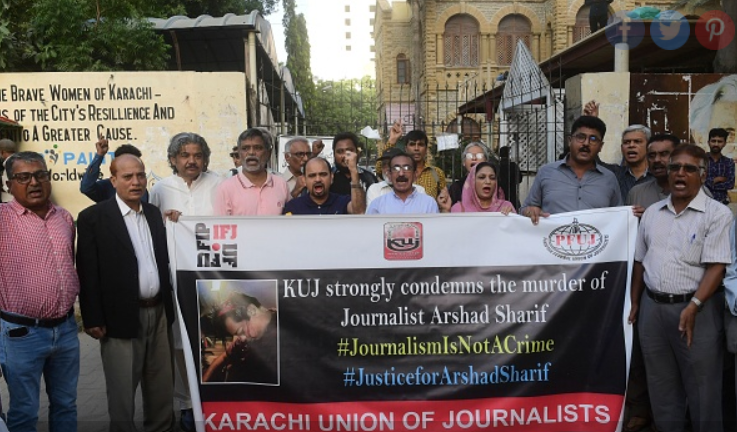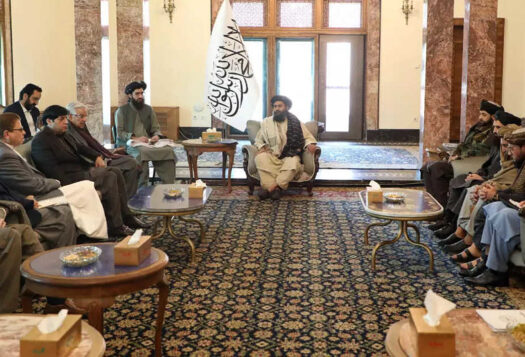
On October 23, Pakistani journalist Arshad Sharif was fatally shot in Kenya, raising concerns of political polarization impacting objective journalism in Pakistan. In the months preceding his murder, Sharif vocally criticized Pakistan’s current government and its powerful military, fueling suspicions of state involvement in his death. While Sharif’s death might have unified the country, its aftermath saw Pakistani leaders leverage the case for political benefit. As factions continue to compete for power, the politicization of Sharif’s death signals dangerous trends for objective journalism in Pakistan.
While the release of a fact-finding report helped clarify many of the murky details in the case, the polarization surrounding Sharif’s death holds greater significance. In the past, conversations may have focused on the shrinking space of media freedoms in Pakistan. Instead, Pakistani leaders used Sharif’s death as an opportunity to gain political advantages. For example, ousted Prime Minister Imran Khan rallied his supporters, the military publicly criticized civilian leaders for the killing, and the current coalition government placed blame back on Imran Khan. Political considerations reigned supreme.
In Pakistan’s struggle to safeguard media freedoms, the events of Sharif’s murder served as a stark reminder that objective journalism has become a casualty in the contest for power.
In Pakistan’s struggle to safeguard media freedoms, the events of Sharif’s murder served as a stark reminder that objective journalism has become a casualty in the contest for power. With greater political polarization and jockeying continuing, the use of media for political benefit suggests worrying trends for democracy in the country, with little indication of reprieve.
The Political Backdrop
Sharif’s murder occurred at a highly polarized time in Pakistan’s political environment. Following his ousting last year, former Prime Minister Imran Khan has proved relentless in his attempt to regain power from the current government. Meanwhile, the ruling coalition continues to face challenges consolidating power in its shaky partnership with former opposition parties. In addition, the powerful military establishment has faced reputational damages after politicians exposed its meddling in civilian affairs, while still seeking its favor. Against this volatile backdrop, Sharif’s death became a tool to gain political advantage.
Although Arshad Sharif was once considered close to the military establishment, he became critical of its role in politics following the controversial ousting of Imran Khan last April. After the ouster, Sharif became an ardent supporter of Khan. In the days following the murder, Khan quickly mobilized public outrage for political gain. On the night he condemned the murder, Khan announced his ‘Haqeeqi Azadi march’ to the capital, during which he criticized the government for ‘threatening journalists’ and implied the state had a role in the murder. While these tactics provided a boon in his political standing, it is worth mentioning that Khan utilized the same repressive tactics while in power.
Amid the commotion, Pakistan’s ruling coalition government also sought to capitalize on Sharif’s death. In a press conference, a senior member of Khan’s PTI party claimed that ‘enemies in the guise of friends’ played a role in Sharif’s death, implying that factions within the PTI were involved in the murder rather than the military or governing parties. The ruling government aired the press conference on state-owned channels, undermining Khan’s narrative while remaining quiet on matters that could disrupt the military’s favor. Further, government officials publicly accused Khan of using Arshad Sharif’s murder for political gain.

Pakistan’s military and intelligence services were also involved in the highly public debate about Sharif’s death. In an effort to counter a buzz of allegations accusing the military of orchestrating Sharif’s murder, Pakistan’s intelligence chief appeared in a press conference for the first time in the country’s history to differentiate “facts, fiction, and opinion.” Rejecting ‘baseless’ allegations on the military’s involvement, the chief pointed fingers back at Imran Khan and used the conference as an opportunity to accuse Khan of demanding ‘unconstitutional favors’ and stopping the military’s transition from a ‘controversial to a constitutional role.’
While Pakistani officials have often curtailed the media to stifle dissent and weaken the opposition, the polarization and manipulation of Sharif’s death were unprecedented. All three major stakeholders – the government, Imran Khan’s PTI, and the military – used the incident to build public support around their respective parties in the ongoing contest for power. Consequently, the events surrounding Sharif’s death indicate that opportunities for political gain will trump democratic and media considerations.
Future Implications of the Blame Game
Truthful and critical reporting will be lost if opportunities for political benefit continue to eclipse protections for democracy. Pakistan’s polarized political environment overshadowed the truth about Sharif’s murder and political stints aimed to strengthen party narratives by capitalizing on his death. Instead of calling for genuine efforts to uncover the truth and uphold democratic norms, Khan hurled accusations against political opponents and the new military leadership sought to shore up its image after General Bajwa. The political maneuvering of the case served to diminish objective insight into the facts, and further narrowed the space for critical journalism in Pakistan.
As political leaders spar, the reckless use of media raises questions over the capacity of the state’s political system to safeguard press freedom in the country.
Although more pronounced in Pakistani politics, Sharif is only the latest among a long list of Pakistani journalists who have been harassed, beaten, intimidated, and killed. Tens of other Pakistani journalists have taken refuge abroad to escape similar consequences. Even those in exile no longer feel safe. While there is much more to uncover about Sharif’s brutal murder, factors that forced him to flee the country reflect the status of critical journalism in Pakistan’s contested political environment. At this juncture, when the government is struggling to consolidate power, the military to restore its image, and Khan to regain control, the country’s leadership is likely to continue leveraging media for political benefit.
While political jockeying surrounding Sharif’s case is just one event in Pakistan’s turbulent domestic environment, its effects will be long-lasting. Deepening political tensions are likely to continue. As political leaders spar, the reckless use of media raises questions over the capacity of the state’s political system to safeguard press freedom in the country. Sharif was a victim of the latest trends of political polarization in Pakistan. His journalism may have raised questions of ethics and credibility for many, but silencing media and stifling dissent shows dangerous trends in Pakistan’s fragile democracy.
***
Click here to read this article in Urdu.
Image 1: Rizwan Tabassum/AFP via Getty Images
Image 2: Asif Hassan/AFP via Getty Images


